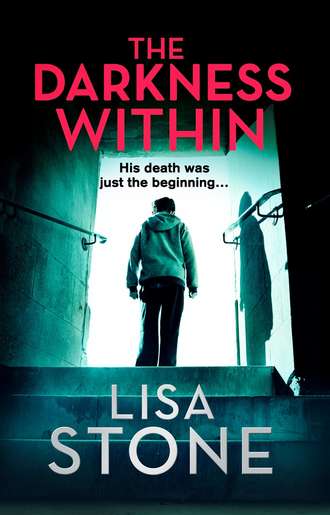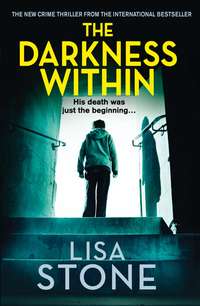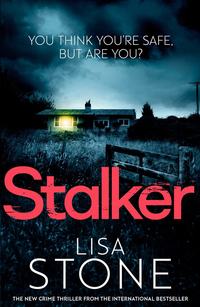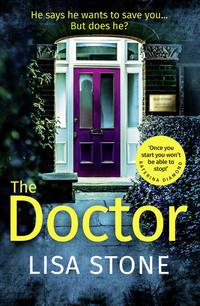
Полная версия
The Darkness Within: A heart-pounding thriller that will leave you reeling
Police, ambulance, and fire tenders arrived within minutes of each other and the officers immediately took control. The police closed off the road in both directions and rerouted the traffic. Portable spot lamps flooded the scene and the fire crew quickly established that there was one male in the vehicle, then set about cutting him free. Sparks flew as they worked and the man and the woman who’d stopped to help told the officers what they knew, which wasn’t a lot as neither had actually witnessed the accident. However, the woman did tell them about the driver who’d overtaken her on a blind bend, and the police officer included it in his notes. Once she and the man had given their statements and contact details, they were allowed to leave.
The lorry driver meanwhile was in a patrol car giving his statement. The police had already completed an initial safety check of his lorry and had found nothing untoward. They’d also looked at his driving licence and insurance, breathalyzed him, and checked his mobile phone, all of which they said was now standard practice at the scene of a road traffic accident. Everything had been in order and the last call he’d made had been before he’d left the hypermarket. As he finished making his statement, they saw the fire crew finally cut the driver free from the now backless car. They laid him on the waiting stretcher where the paramedics took over. An oxygen mask was placed over his mouth and nose and a line ran from his arm to a bottle held up by one of the paramedics. As they prepared to load the stretcher into the ambulance, the lorry driver turned to the officer beside him and asked, ‘Do you think you could find out how he is?’
‘I’ll see what I can do,’ he replied helpfully.
The driver watched through the windscreen as the officer went over and spoke to two of his colleagues. It had stopped raining now but a damp mist hung over the scene. They talked and nodded and at one point smiled. The ambulance sped away, its siren wailing and light flashing.
‘He’s got a broken leg and arm and a head injury,’ the officer said on his return. ‘They’ll know more once he’s at the hospital, but it seems he’s lucky to be alive.’ He paused, then added, ‘He’s known to us. He’s already lost his licence and there’s alcohol in his blood.’
The lorry driver let out a sigh of relief. He was very sorry that the accident had happened at all, but it could have been a lot worse. Supposing there’d been a seriously injured woman or child in the car – or even someone killed? He’d never have forgiven himself.
Chapter Four
Rosie had almost stopped shaking now. She’d had to force herself to appear calm. Shane would be back at any moment – indeed she had expected him sooner – and he hated to see her crying and trembling. She looked silly, pathetic, he always said, like a scared-shitless rabbit. It reignited his anger if he saw her in a state.
‘Surely you’re not scared of me!’ he would say, and she’d tell him she wasn’t, trying to keep her voice steady to belie how frightened she truly was. Of course she wasn’t scared of him. She loved him. While this was true some of the time, those moments were now few and far between. Even when she wasn’t in fear of him she was on her guard, walking on eggshells, constantly making sure she didn’t upset or disappoint him. It was hard work keeping him happy and the strain was taking its toll, so much so that she wasn’t sure what was worse: being attacked or anticipating it. Life was so confusing now, especially when he apologized and told her how much he loved her and that it would never happen again.
When did her life become this difficult? She knew the answer. A week after he moved in.
Rosie had wiped the blood from her face and cleaned the vomit from the floor, scrubbing the carpet with disinfectant until the smell of sick had gone. She often vomited after he attacked her; she thought it was from shock and the pain of being punched in the stomach. She never used to be sick – not before. She’d been very healthy and happy back then, before he’d moved in. But now even thinking about his anger and what he might do to her caused her stomach to contract and the bile to rise to her throat.
Shane liked everything to be back to normal with no trace of ‘their fight’ when he returned, so she’d also changed out of her blood- and vomit-splashed clothes. They were in the washing machine. The duvet cover would go in once the first load had finished, and she’d already put a fresh cover on the bed. The only sign of their fight now was her swollen lip. She’d managed to stop the bleeding by pressing a wet tissue on the cut, and make-up had covered the redness and bruising around her mouth and on her cheek, but it couldn’t hide the swelling. In fact, if anything, it accentuated it.
Had she really deserved the beating? she wondered as she examined her face again in the bathroom mirror. Was it really always her fault? Did she provoke him beyond reason as he accused her of doing? She honestly didn’t know. So much of her life had changed in the last six months that she barely recognized herself any more. Work colleagues and her mother had noticed the change in her too and had commented. Her mother, aware of Shane’s past, had never liked him and refused to have him in her house, saying he was a ‘bad lot’ and that a leopard never changed its spots. Her friends, even her best friend Eva at work, had never met Shane because she no longer went out socially. Shane didn’t like it. Rosie wished she could have confided in Eva or her mother. They might have been able to offer a fresh perspective and make some suggestions on how to help, but she knew that was out of the question. Shane had told her plenty of times that if she went blubbering to anyone he’d have to kill her, and she believed him.
The doorbell rang, making her start. Shane? Why didn’t he use his key? Had he lost it? Quickly checking her appearance in the mirror again she glanced around the living room, making sure everything was back to normal, then gingerly went into the hall and opened the front door. Two uniformed police officers stood side by side.
‘Rosie Jones?’ the woman police officer asked.
Rosie nodded, a sinking feeling hitting the pit of her stomach. Shane had promised to keep out of trouble.
‘I’m PC Linda Simpson and this is my colleague PC Tim Marshall. I believe you own a car with the registration number BA06 FYS?’
Rosie’s mouth went dry and her legs began to tremble. ‘Yes. Why?’
‘I’m afraid there’s been an accident. May we come in?’
Rosie stared at them, not fully understanding. She’d been expecting Shane and now this? ‘What sort of accident?’
‘I think it would be better if we came in to explain,’ Linda said.
Rosie moved aside to let them in.
‘In here?’ the policewoman asked, nodding to the living room.
‘Yes,’ Rosie said, and followed them in.
She sat on the sofa and Linda sat beside her, while Tim took the single armchair: Shane’s chair. She saw them glancing around. Were they looking for something? Her lip began throbbing.
‘Your car was involved in an accident earlier tonight along Bells Lane,’ Linda said, turning slightly so she could look at Rosie. ‘A person called Shane Smith was driving. Do you know him?’
Rosie nodded. ‘He’s my boyfriend. He lives here.’
‘I’m sorry, he’s injured and is being treated at St Mary’s Hospital,’ Linda continued. ‘He has a nasty head injury but it isn’t thought to be life-threatening, so he’s been quite lucky considering the state of the car. You’ll be able to find out how he is later.’ Rosie nodded. ‘You knew Shane was driving your car? You gave him permission to do so?’
‘Yes,’ Rosie said, her voice unsteady. ‘He has a key.’
Linda touched her arm, concerned. ‘Are you OK, love? You’re very pale. Can I get you a drink of water?’
‘No, I’ll be all right.’
‘He’s been well looked after,’ Linda reassured her. ‘But I’m afraid the car’s a write-off. He seems to have escaped with some broken bones and a head injury, but it could have been a lot worse. Do you mind if I ask you a few questions?’
‘No,’ Rosie said. PC Tim Marshall took out his notepad and pen.
‘How long have you known Shane?’
‘Not long. He went to my school for a while.’ Rosie tried to keep her voice steady. ‘But I hadn’t seen him for years.’
‘And how long has he been living here?’
‘Four months.’
‘So you hadn’t been in touch with him before you became a couple and moved in together?’
‘No,’ Rosie confirmed. ‘I met him by chance and he had nowhere to live.’
‘Where was he before he came here, do you know?’ Linda looked at her carefully.
‘He was in prison, for something he didn’t do,’ Rosie said, and saw the look the police exchanged. Her cheeks burned.
‘So he came straight here then after his release?’ Linda asked.
‘He went to his mother’s first but she didn’t want him there.’
Linda nodded. ‘Did he tell you why he was in prison?’
‘No. He didn’t like talking about it. He wanted to put it behind him and make a fresh start.’
‘It was for GBH – grievous bodily harm. Were you aware he’d lost his driving licence for drink-driving offences? Shane wasn’t allowed to drive.’
‘Oh,’ Rosie said, genuinely shocked. ‘I didn’t know.’
‘To allow someone to drive your vehicle if they are banned is a criminal offence,’ Tim added.
‘I’m sorry, I didn’t know,’ Rosie said again. ‘I put him on my insurance,’ she added, hoping this would make it better.
‘Driving while banned invalidates any insurance I’m afraid,’ Linda said. ‘They won’t be paying for your car.’
Rosie looked at her. ‘Will they keep Shane in hospital tonight?’ she asked.
‘For quite a few nights,’ Tim said, glancing up from writing. ‘He had to be cut from the wreckage.’
‘Thank you,’ Rosie said politely.
She saw them exchange another pointed glance and realized it wasn’t the reaction they would have expected, but she was a bit overwhelmed at present and struggling to take everything in.
‘That’s a nasty cut on your lip,’ Linda said.
‘I fell,’ Rosie said, her hand going nervously to her mouth.
‘Tonight?’ Linda asked.
‘Yes.’
Linda held her gaze. ‘Look love, I’ll be honest with you. Shane broke the terms of his probation by not informing his probation officer where he was living. Added to which, he was driving while banned, over the legal limit of alcohol in his blood and in a manner likely to cause harm to other road users. As soon as he’s out of hospital he’ll be returning to prison.’
‘Oh, I see,’ Rosie said. ‘I didn’t realize.’
‘No. I take it he didn’t involve you in his criminal activities? He hasn’t been arriving home with expensive items, for example? Items he can’t provide receipts for?’
‘No, not as far as I know. You can have a look around if you like.’
‘Thank you.’ Tim was already on his feet.
‘So Shane won’t be home tonight?’ she asked, still trying to come to terms with it.
‘No. You can phone the hospital now if you want and see how he is.’
‘I will,’ Rosie said. ‘After you’ve had a look around.’
She watched as Linda joined Tim and they went first into the bedroom. The flat was only small and Rosie could hear them moving across the floorboards, opening and closing the wardrobe doors, and then the drawers. There was nothing to see in there apart from the wet patch on the carpet smelling of disinfectant. She’d no idea what they were searching for and frankly she didn’t care. Shane wasn’t coming home tonight and she was starting to feel relieved. They came out of the bedroom and searched the bathroom and then had to pass through the living room to enter the kitchen. She heard them open and close the cupboard doors.
‘You’re very good doing your washing on a Saturday evening,’ Linda called.
‘Yes,’ she said quietly.
She heard the stainless-steel bin ping as one of the officers opened and closed it. They would have seen the bloody tissues she’d used to wipe her bleeding nose and mouth. And very likely the duvet cover in the laundry basket waiting to go in the wash. They came out and Linda returned to sit beside her while Tim remained standing.
‘Is there anything you want to tell us about Shane?’ Linda asked, encouraging confidentiality.
Rosie shook her head. Linda looked at her for a moment longer then sighed.
‘OK, love. I’m going to give you the number for the Domestic Violence Unit anyway,’ she said, taking a card from her pocket and handing it to her. ‘You can just phone for a chat if you wish. You don’t have to give your name.’
Rosie gave a small nod but didn’t look at the card.
‘We’ll leave you to it then. Phone us if you need to. We can see ourselves out.’
Rosie stayed where she was as they left. She was still struggling to come to terms with what had happened and wondering what she should do for the best. Phone her mother? Phone the hospital? Speak to the Domestic Violence Unit, or change the locks? Possibly all of them, but in which order? Suddenly her life had changed in a way she could never have foreseen, and while she was sorry Shane had had an accident it had opened up an escape route. A huge weight lifted from her shoulders. There were decisions to be made and opportunities to be taken, and a light now shone at the end of what had been a very dark tunnel. She needed to galvanize herself into action. The washing machine bleeped as it finished its cycle and she stood to unload it. Once she’d sorted out the washing she’d start packing Shane’s belongings. And although she wasn’t a religious person, she said a silent thank-you to someone out there, grateful that she had been given this chance.
Chapter Five
The Reverend Andrew Wilson was going about his normal early-morning duties. He’d let Mitsy, their old Labrador, out for a run, had taken his wife and son up a cup of tea and now set out across the Maybury village green to unlock his eighteenth-century church, St Stephen’s. Mitsy had followed him as usual, circling playfully at his feet, despite her age. Dressed casually but wearing his clerical collar he walked swiftly across the damp grass, still wet from the rain of the night before. At 8 a.m. on a weekday he didn’t expect to see many of the villagers out; the commuters had already left for the station in the neighbouring town, so he tended to see the same few faces: the milkman who also delivered groceries, the paperboy finishing his round before going to college, and two dog-walkers. They all greeted him as usual with a warm, pleasant but slightly formal, ‘Good morning, Reverend,’ and he replied using their first names. He knew most of the villagers in his parish by name and he liked the village way of life. His previous parish had been in a deprived inner city which he’d initially believed was his calling. He’d done his best for five years and then asked to be moved, saying he felt he could no longer meet the challenges with everything else that was going on in his life. The bishop had been very understanding, and three months later he and his family had arrived here.
Unlocking the outer door, Andrew left Mitsy sitting obediently in the vestibule as he unlocked the second door and went into the main body of the church. He savoured the welcoming aroma of well-oiled oak, candle smoke, and the slightly musky damp of the solid stone walls. It was reassuring and comforting; a reminder of age and endurance. The church had stood here for nearly 300 years and would remain long after he had left this earth. That he was merely passing through and part of a bigger plan helped nudge his considerable worries into a slightly better perspective.
Facing the altar, he stood at the end of the aisle and crossed himself, then went to a box on the wall and switched on the lights and heating. Mrs Tremain, much-respected chairperson of the parish council, would arrive punctually at nine o’clock as she did most mornings to say a prayer in memory of her dear departed husband, and she didn’t like to be cold. Then at ten o’clock his darling wife, Liz, would lead the Bible study class while he went about his many duties in the parish. He would return to lock the church at nightfall as he did every evening apart from Sunday when he held Evensong. It was a pity the church couldn’t remain open twenty-four hours as it had in previous times – offering shelter and warmth to the needy – but vandals and thieves had put a stop to that some years before when they’d stolen the silver candlesticks from the altar and smashed a stained-glass window.
Andrew went up the aisle to the little altar with its white cloths, simple wooden cross, Bible, and candles in steel holders. Lowering his head he began his usual silent prayers, thanking the Lord for all that He had blessed them with, remembering those less fortunate and those living in famine and war-torn countries. He asked for guidance to make decisions wisely, and then mentioned by name parishioners who needed some extra help: Mr and Mrs James, whose son had been injured while serving in the army abroad; Mrs King’s husband, who was recovering from stomach surgery; Mr and Mrs Watson, who had just moved into a nursing home and whom he would visit later that afternoon; and last but not least his own son, Jacob. He always felt slightly uncomfortable, almost guilty, asking for help for his own, but he was sure the good Lord understood why it had become absolutely necessary. He wouldn’t have asked had it not been essential. Forgive me Lord for asking again but if it is your will … He struggled now; his prayer needed to be answered even if it wasn’t the Lord’s will. He was desperate and his wife was desperate too, and if he was honest they were both struggling with their faith, as they were being tested as never before. When life went well it was easy to have faith, he acknowledged, but when it went badly, really badly, and you stood to lose your only child, it was surely enough to shake the faith of even the most devout and ardent of believers?
‘Please don’t test me further in this way,’ he said as part of his prayers. ‘Anything but this. Not my son.’ As he spoke, the small inner voice of God reminded him that He had sacrificed His only son for the sake of humanity, which wasn’t what Andrew wanted to hear at all. He finished praying by thanking the Lord again and then asking that this day be the one.
Uncharacteristically, Mitsy began frantically scratching at the church door. Crossing himself, Andrew turned from the altar just as the door flew open and his wife Elizabeth ran in, without her coat and out of breath.
‘What is it?’ he asked, panic-stricken, and fearing the worst news possible.
‘They’ve found a donor!’ she cried. ‘It looks a good match. We have to leave now. Come on! I’ve left Jacob getting up. We’ll phone and cancel our appointments from the car. Be quick.’
Mitsy barked as though sharing this good news, and as Andrew hurried after his wife he thanked the good Lord for answering his prayers, and promised he’d never ask for anything for himself again.
Upstairs in the rectory Jacob had managed to wash and partially dress himself and was now sitting on the edge of his bed trying to catch his breath. Stick-thin, pale, permanently exhausted, and out of breath even with the minimal exertion, he’d been off work sick for nearly a year. At 23, having left university with a degree in business studies, he’d been six months into his first job when illness had struck, and a range of symptoms were eventually diagnosed as congenital heart disease. His heart began failing fast and he and his parents were told that a heart transplant was his only hope. While he didn’t have the strength of faith his parents had, he did believe in something – a deity? He too now said a short prayer of thanks before texting the good news to his long-term girlfriend, Eloise.
His parents arrived in his room together. He couldn’t remember a time when they’d looked so relieved and happy. While his mother helped him finish dressing his father checked his bag, which had been packed since he’d been put on the transplant list, ready and waiting for the call. Downstairs they shut Mitsy in the kitchen with food and water (a neighbour would take her out later) and barely thirty minutes after receiving the call they were on their way, overjoyed, but not forgetting that another family had lost a loved one to make this happen.
Chapter Six
At the transplant centre a specialist team of doctors and nurses was now assembling as two operating theatres were being prepared, one to remove the donor heart and the other to implant it into the recipient. It was unusual for the donor and recipient to live so close – just twenty miles apart. The transplant programme stretched nationwide and organs often had to be transported miles and at great speed when a donor was matched with a recipient at the other end of the country, although neither the donor’s next of kin nor the recipient of the heart would be aware of this. Their details were confidential and would be kept secret unless they both wanted to know who the other person was. Sometimes the recipient wanted to thank the donor’s next of kin, and if they agreed they were sensitively put in contact with each other, but this was unusual, and often resulted in a heart-warming story in the press or on the news.
It wasn’t just the heart that was being removed. The donor’s family had given consent for all of his body to be used, so as well as his heart going to Jacob, the kidneys, liver, lungs, pancreas, intestine, corneas, skin, nerves, veins, tendons and even the bones from his legs were going to benefit others.
When Jacob arrived at the transplant centre with his parents they were shown to a single room where nurses weighed and measured him, checked his temperature and blood pressure before listening to his chest to make sure he was well enough to undergo surgery. He confirmed he hadn’t had anything to eat that morning; they then took a blood sample and gave him a pot for a urine sample. The anaesthetist arrived, explained what he would be doing and asked him if he’d ever had a bad reaction to an anaesthetic before. He hadn’t – the only surgery he’d had in the past was a tonsillectomy at the age of six. The two surgeons leading the team arrived shortly after and the atmosphere in the room became electric – joyous, with a sense of occasion. They went over the procedure again with Jacob and his parents and reassured them that all would be well. It was a good tissue match, they said, and they would gown up now and see him later. Before prepping began, Jacob’s parents had to say goodbye. ‘We’ll be here when you wake,’ his father told him.
‘And I’ll phone Eloise,’ his mother said, knowing that it could be a few days before he was out of intensive care and could receive visitors.
One of the nurses gently showed them out, reminding them that Jacob was in very good hands – the best. She suggested they went into the city and had some lunch to pass the time as it would be at least four hours before there was any news. She would call as soon as Jacob was out of theatre. They thanked her, but before they left they made a detour to the hospital’s little chapel, where they asked the dear Lord to watch over Jacob and the donor family who had given so generously and were now grieving over their loss.
Chapter Seven
After the transplant and following usual practice, Jacob was taken directly to the intensive care unit where he was kept sedated, connected to a ventilator to help with his breathing, and given a drip passing fluids and medication into his arm. As with the other transplant patients, doctors and nurses monitored him around the clock until he was stable enough to be removed from the ventilator and brought out of the drug-induced coma.
As Jacob rose up through the layers of consciousness, he began swearing and cursing at the nurses, saying things he wouldn’t have done when fully awake. He told one nurse to ‘fuck off’ and another that he’d like to ‘give her one’, before trying to grab her breast.






